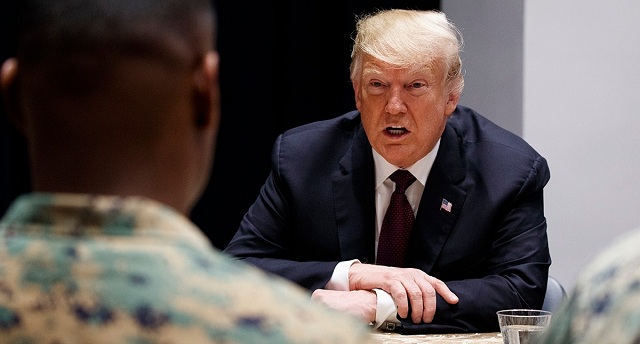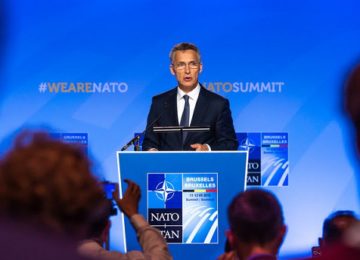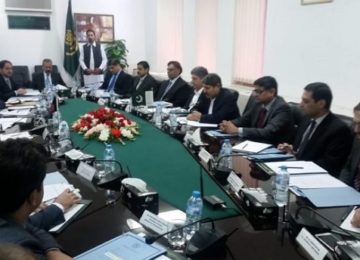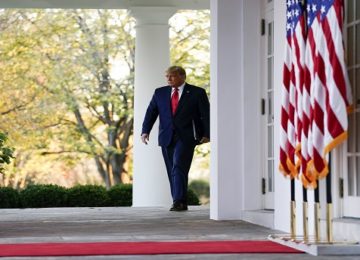March 15, 2019.
Is US President Donald Trump on the verge of striking a peace deal? Ironic that it may sound, but probably yes!
Let us see why?
By reaching out to Pakistan and opening direct talks with the once despised Taliban late last year, President Trump literally dumped his August 2017 Afghanistan/South Asia Strategy. With this, Trump also began challenging the cobweb of geopolitics that the American establishment had woven around the world; mostly notably the involvement of the Central Intelligence Agency (CIA) on foreign soil.
By cancelling his country’s military exercises with South Korea worth $100 million, and forcing other NATO members to cough up millions of dollars in contributions for the alliance, the President has simply trashed the geo-political narrative that the US “deep-state” had carved for its military adventures in various parts of the world. Trump’s decision of cancelling the war exercises was reported in the media after his meeting with North Korean Chairman Kim Jong-un in late February.
Following up on Trump’s resolve to cut the costs of U.S. military engagements abroad, Senate Foreign Relations Committee members Rand Paul (R-KY) and Tom Udall (D-NM) introduced the 2019 American Forces Going Home After Noble (AFGHAN) Service Act to end America’s longest war.
Rand Paul pointed out that the Afghan war had cost over 2,300 soldiers and $2 trillion in costs, with the war currently costing over $51 billion a year. Co-mover Senator Tom Udall (D-NM), in his reference to the longest war overseas said:
“Soon, U.S. service members will begin deploying to Afghanistan to fight in a war that began before they were born. As we face this watershed moment, it’s past time to change our approach to the longest war in our country’s history”.
This explains the rush and the deep engagement by the Trump special envoy for Afghanistan peace Zalmay Khalilzad.
“When the agreement in draft about a withdrawal timeline and effective counter-terrorism measures is finalized, the Taliban and other Afghans, including the government, will begin intra-Afghan negotiations on a political settlement and comprehensive cease-fire,” special envoy Zalmay Khalilzad explained at the end of his talks with the Taliban on Tuesday.
The progress – if any – of his mission is explicit in a rare audio message on March 14 by Mullah Abdul Ghani Baradar, the Taliban deputy leader in Doha. The negotiations, Baradar noted, had laid “good ground” for future discussions and “paved the way” for finding a solution to the war.
Signalling a spirit of national reconciliation, Baradar almost stopped short of saying the Taliban were fighting to regain power – even if symbolic for image salvation – but vibes for his detractors are not positive.
“Those who develop a good understanding with us and do not deceive or seek enmity with us, we will consider them like our brothers. They should not be worried or concerned because all Afghans should sit together and Taliban leaders will show mercy for everyone in an environment of mutual respect,” the deputy Taliban leader said.
Based on recent developments, Zalmay Khalizad’s public tweets and Taliban leader Baradar’s interview, the following conclusions need to be kept into consideration on the progress of the Afghan peace process:
First, the divisions within the Afghan Unity government have sharpened. President Ghani is feeling increasingly isolated. Moreover, he has annoyed the Afghan CEO Dr. Abdullah Abdullah along with Ustad Mohaqiq and former Balkh governor Ata Noor. Moreover, President Ghani has gradually lost his authority to the US-Taliban talks and is therefore resisting any progress in the peace process.
Second, the US, under President Trump, is desperate to pull-out of Afghanistan to save billions of dollars that it is spending on the Afghan war. Moreover, even the US partners, especially the European Union, are now sensing that “peace is around the corner”.
Third, President Trump has also acknowledged the overwhelming regional consensus on the position of Taliban in Afghanistan (Russia, China, Iran, Pakistan and Turkey) and has apparently conceded to these countries the task of peace and reconciliation. The Taliban, on the other hand, have also toned down their narrative as according to its top leadership, “peace in Afghanistan matters the most, irrespective of the form of government”.
Finally, refusal of visa (on technical grounds) to Ghani’s aide and former spy Chief Amrullah Saleh for a conference at the Hudson Center (held on March 14) in the US, indicates that Washington is not ready to listen to the anti-peace forces of status quo in Afghanistan. Moreover, in a rare rebuke, the summoning of Afghan National Security Advisor Hamdullah Mohib, as reported in the media, hours after he criticised Zalmay Khalilzad for “bypassing the elected government of Afghanistan”, also suggests that the US is currently refusing to entertain any hawks in Kabul.
The US-Taliban talks are currently indicating towards the formation of a national interim government, comprising of the Taliban and what Mulla Baradar considers as Reconcilable National Leaders. However, this formation could still see some roadblocks. The Afghan security establishment, in collusion with “spoilers”, could push back against the peace talks. Moreover, young Afghans, who are against both the Taliban and violence in Afghanistan, could also reject any peace deal as these youth believe that the group does not represent a majority of the Afghan people.
The writer Imtiaz Gul is the Executive Director of the Center for Research and Security Studies (CRSS).








